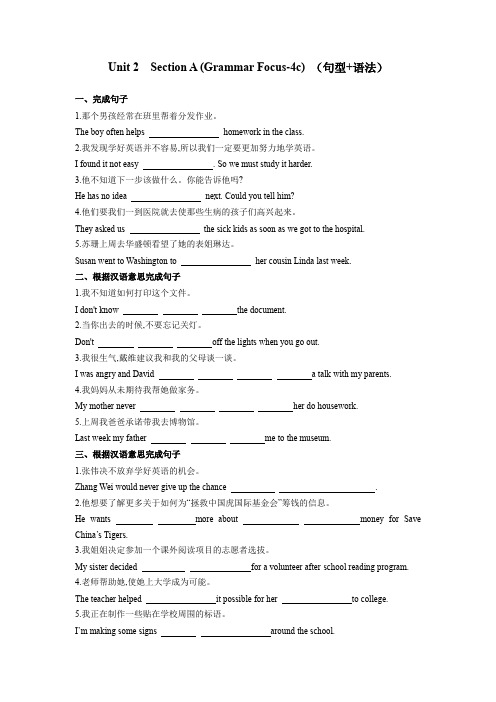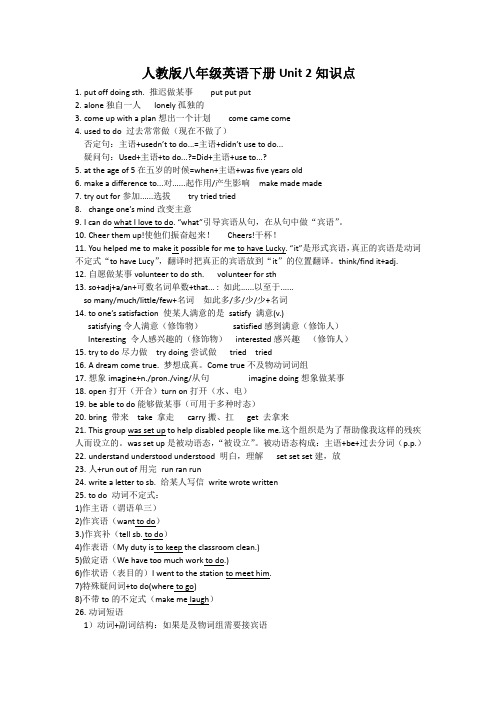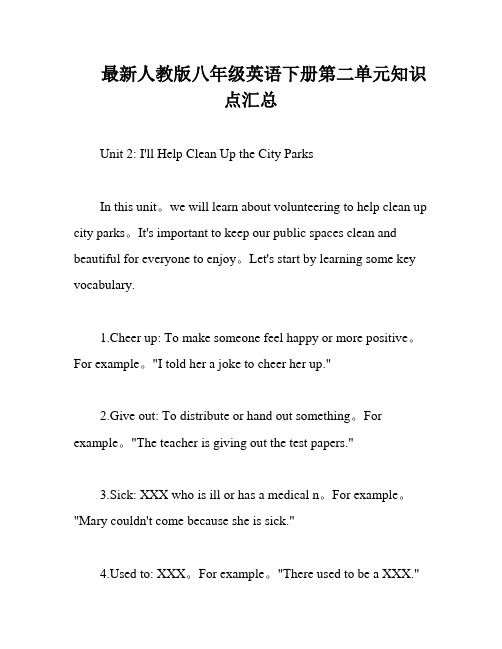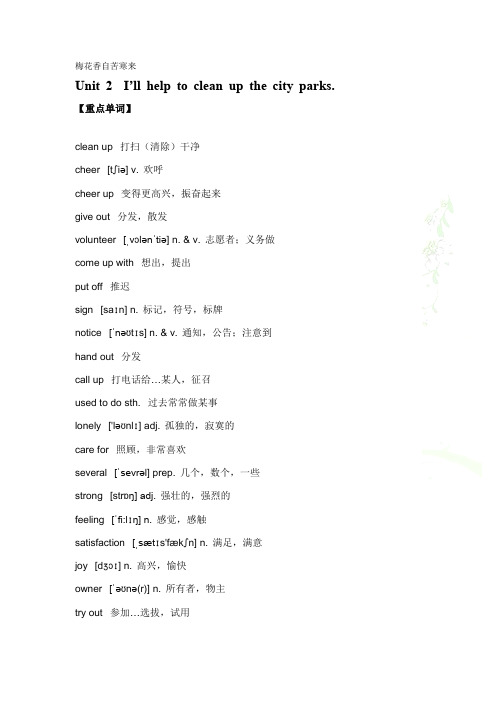人教版英语八年级下册 Unit2 语法归纳
八年级下册英语Unit2单词讲解与语法归纳

八年级下册英语Unit2单词讲解与语法归纳八年级下册英语Unit2单词讲解与语法归纳八年级下册英语Unit2单词讲解与语法归纳单词讲解:1.tooloud太大声2.outofstyle过时的3.instyle流行的4.callsbup=ringsb.up=call/ring/phonesb.给…..打电话5.enoughmoney足够的钱(enough修饰名词时不必后置)6.busyenough够忙(enough修饰形容词或副词时必须后置)7.aticketto/foraballgame一张球赛的门票注意:thekeytothelock/thekey(answer)rtothequestion)/thesolutiontotheproblem.此处几个短语不能用of表示所有格8.talkabout谈论9.onthephone用电话10.payfor付款11.spend…on+sth.=spend...(in)doingsth.在…花钱12.Ittakessb.sometimetodosth.某人做某事花…的时间13.borrow…from从….借(借进来)14.lend…t o把…借给(借出去)15.Youcankeepthebookforaweek你可以借这本书一周(不用borrow或lend)16.buysthforsb为……买东西17.tellsbtodo/nottodosth.sth告诉某人做某事18.wantsb.todosth.=wouldlikesb.todo想某人做某事19.findout发现;查清楚;弄明白20.playone’sstereo放录象21.failthetest=notpassthetest考试不及格22.failin(doing)sth…在...上失败,变弱23.succeedin(doing)sth在...方面成功24.writesbaletter/writetosb.给某人写信25.surprisesb.使某人吃惊(类似有:surprise/interest/please/amaze+某人)26.toone’ssurprise使某人吃惊的是…..27.toone’sjoy使某人高兴的是…..28.lookforapart-timejob找一份兼职的工作(不一定有结果)29.get/findapart-timejob找到一份兼职的工作(有结果)30.asksb.for…寻求/向某人要某物31.haveabakesale卖烧烤32.arguewithsb=haveanargumentwithsb.与某人争吵33.haveafightwithsb.=fightwith与某人打架34.dropoff离去;散去;逐渐减少;死去35.preparefor…=getreadyfor…为…做准备36.after-schoolclubs(activities)课外俱乐部(活动)lbe/getusedtodoing习惯做某事lusedtodo过去经常/常常做某事lbeusedfordoing=beusedtodosth.被用于做某事37.fill…up填补;装满…befullof装满38.returnsth.tosb.=givesth.backtosb.把某物归还给某人39.geton/alongwellwith与…相处很好40.allkindsof各种各样41.asmuchaspossible=asmuchasyoucan尽可能多42.takepartin=joinin参加(某种活动/集会)43.abit=alittle一点儿(当修饰形容词或比较级时)44.abitof=alittle一点儿/一些(当修饰不可数名词时)45.beangrywith…生…的气46.byoneself=onone’sown某人自己/独自地47.ontheonehand一方面48.ontheotherhand另一方面49.Ifind/feel/thinkitdifficulttodo...我发现/感到/认为做某事很难.50.see/hear/watchsb.doingsth.看到/听见/注视某人正在做…51.not…until直到…才(谓语动词一般是非延续动词)52.表示某人情绪有关的形容词用法:be/bee+upset/tired/excited/interested/worried/surprised/amazed/annoy ed说明:当主语是某人时,注意后面的形容词一般是-ed结尾的单词,而当主语是某物时或修饰名词时,注意后面形容词一般是-ing结尾单词.)例如:Iwassurprised/interested/amazedwhenIheardthesurprising/interesting/ama zingnews.53radioadviceprogram电台提建议的节目54beoriginal新颖的55.leavesomethingsomewhere把某物忘在某处56sportsclothes运动服57.thesameageas=asoldas和---年龄一样58.thetiredchildren疲惫不堪的孩子59.plainabout(doingsth)抱怨、、、60.taketheirchildrenfromactivitytoactivity带着孩子参加一个接一个的活动61.trytodosth,尽量干某事trydoingsth试着干某事62.beundertoomuchpressure压力太大63.amotherofthree三个孩子的妈妈64.takepartinafter-schoolclubs参加课后俱乐部65.itionstartsfromaveryyoungage竞争从很小年纪就开始了66.pare…with和---比较anizedactivities有组织的活动。
人教版八年级下册英语Unit 2知识点汇总

人教版八年级下册英语Unit 2知识点汇总一、常考短语clean up 打扫(或清除)干净cheer up(使)变得更高兴;振奋起来give out 分发;散发come up with 想出提出(主意、计划、回答等)put off 推迟hand out 分发call up 打电话给(某人);征召used to曾经……“;过去…care for照顾;非常喜欢try out参加………选拔;试用fix up修理;装饰give away赠送;捐赠take after(外貌或行为)像set up 建起;设立make a difference 影响;有作用put up 张贴;搭建;举起help out 帮助……摆脱困境give up 放弃come true 实现run out of 用尽;耗尽be similar to 与………相似volunteer to do sth 自愿做某事make plans to do sth 制订计划做某事ask sb (not) to do sth 要求某人(不要)做某事used to do sth 过去常常做某事give up+时间+to do sth腾出时间做某事get a feeling of 产生…的感觉decide to do sth 决定做某事help sb (to) do sth帮助某人做某事make a difference to对…产生影响make it possible for sb to do sth使得做某事对某人来说成为可能三、经典句型1.You could help to clean up the city parks. A(9)你可以帮助打扫城市公园。
(1)could意为“能;可以”,其后接动词原形,可以用于提出建议,语气比can委婉。
You could walk to the park.你可以步行去公园。
拓展:could表示过去的能力时,是can的过去式。
Unit2(GrammarFocus-4c)(句型 语法)2021-2022学年人教版英语八年级下册

Unit 2 Section A (Grammar Focus-4c) (句型+语法)一、完成句子1.那个男孩经常在班里帮着分发作业。
The boy often helps homework in the class.2.我发现学好英语并不容易,所以我们一定要更加努力地学英语。
I found it not easy . So we must study it harder.3.他不知道下一步该做什么。
你能告诉他吗?He has no idea next. Could you tell him?4.他们要我们一到医院就去使那些生病的孩子们高兴起来。
They asked us the sick kids as soon as we got to the hospital.5.苏珊上周去华盛顿看望了她的表姐琳达。
Susan went to Washington to her cousin Linda last week.二、根据汉语意思完成句子1.我不知道如何打印这个文件。
I don't know the document.2.当你出去的时候,不要忘记关灯。
Don't off the lights when you go out.3.我很生气,戴维建议我和我的父母谈一谈。
I was angry and David a talk with my parents.4.我妈妈从未期待我帮她做家务。
My mother never her do housework.5.上周我爸爸承诺带我去博物馆。
Last week my father me to the museum.三、根据汉语意思完成句子1.张伟决不放弃学好英语的机会。
Zhang Wei would never give up the chance .2.他想要了解更多关于如何为“拯救中国虎国际基金会”筹钱的信息。
He wants more about money for Save China’s Tigers.3.我姐姐决定参加一个课外阅读项目的志愿者选拔。
人教版八年级英语下册Unit2语法

人教版八年级英语下册Unit 2知识点1.put off doing sth. 推迟做某事put put put2.alone独自一人lonely孤独的e up with a plan想出一个计划come came comeed to do 过去常常做(现在不做了)否定句:主语+usedn’t to do...=主语+didn’t use to do...疑问句:Used+主语+to do...?=Did+主语+use to...?5.at the age of 5在五岁的时候=when+主语+was five years old6.make a difference to...对......起作用/产生影响make made made7.try out for参加......选拔try tried tried8.change one’s mind改变主意9.I can do what I love to do. “what”引导宾语从句,在从句中做“宾语”。
10.Cheer them up!使他们振奋起来!Cheers!干杯!11.You helped me to make it possible for me to have Lucky. “it”是形式宾语,真正的宾语是动词不定式“to have Lucy”,翻译时把真正的宾语放到“it”的位置翻译。
think/find it+adj.12.自愿做某事volunteer to do sth. volunteer for sth13.so+adj+a/an+可数名词单数+that... : 如此......以至于......so many/much/little/few+名词如此多/多/少/少+名词14.to one’s satisfaction 使某人满意的是satisfy 满意(v.)satisfying令人满意(修饰物)satisfied感到满意(修饰人)Interesting 令人感兴趣的(修饰物)interested感兴趣(修饰人)15.try to do尽力做try doing尝试做tried tried16.A dream come true. 梦想成真。
人教版八年级英语下册各单元语法点汇总

U n i t1W h a t’s t h e m a t t e r 一、询问某人的健康问运及遭到麻烦的表达方法1询问某人患了何种疾病或遇到了何种麻烦时;常用以下几种结构来表达:What’s the matter with sb.某人怎么了What’s wrong with sb.某人怎么了What’s the trouble with sb.某人出什么事了What happened to sb.某人发生了什么事Are you OK你没事吧Is there anything wrong with sb. 某人有什么事吗(2)要表达身体疼痛或不舒服;可用以下结构:①某人+have/has+病症.The twins have colds.双胞胎感冒了..某人+have/has+a+headache/toothache/stomachache/backache/earache.She had a stomachache last night.她昨晚肚子痛..③某人+have/has+a+sore+发病部位. He has a sore throat.他喉咙痛..④某人+hurts+身体部位或反身代词. He hurt his leg.他的腿受伤了..⑤某部位+hurts.My head hurts badly.我头痛得厉害..⑥某人+have/has+a pain+in one’s+身体部位; I have a pain in my chest.我胸口痛..⑦There issomething wrong with one’s+身体部位.There is something wrong with my right eye..我的右眼有毛病..⑧其他表达方式She has a heart trouble.她有心脏病..He got hit on the head他头部受到了撞击..She cut her finger.她割破手指了..二情态动词should的用法1.Should为情态动词;意为“应该;应当”;否定式为shouldn’t;其后接动词原形;无人称和数的变化..常用来表示征询意见、建议、劝告、要求或义务等.. You should drink hot water with honey.你应该喝加有蜂蜜的开水..He should put his head back他应该把头后仰..We should try our best to help him.我们应当尽力去帮助他.. You shouldn‘t watch TV.你不应该看电视..2.Should用于主语为第一人称的疑问句;表示征询意见.. Should I put some medicine on it 我应当给它敷上药吗 Should we tell her about it我们应该告诉她这件事吗拓展在英语中;表示建议的说法有很多;而且都是中考考查的重点..主要结构有:①Would you like to do sth.你想要/愿意做某事吗Would you like to play basketball with me你想要和我一起打篮球吗②Shall I/we do sth 我/我们做好吗Shall we go to the zoo tomorrow明天我们去动物园;好吗③Why not do sth 为什么不呢Why not join us为什么不加入到我们当中来呢④How/What about doing sth 做某事怎么样 How about going swimming去游泳怎么样⑤Let’s do sth让我们做吧.. Let’s go home.咱们回家吧..⑥You’d better not do sth你最好不要做某事..You’d better not go there alone.你最好不要一个人去那儿..Unit 2 I'll help clean up the city parks动词不定式A. 作主语——为避免句子的头重脚轻;常用it作为形式主语;而真正的主语动词不定式后置..常用句型:It +be+adj./n.+for/of sb. to do sth./It takes sb. some time to do sth.B. 作宾语——动词want; decide; hope; ask; agree; choose; learn; plan; need; teach; prepare…常接动词不定式作宾语..C. 作后置定语——常用于“have/has+sth.+to do”或“enough+名+to do”“It’s time to do sth.”等结构中..D. 作宾语补足语——tell; ask; want; invite; teach; like; call等可接带to的动词不定式作宾语补足语;构成tell/ask/want /call/invite sb. to do sth.结构..“一感feel;二听listen to; 注意动词不定式作使役动词和感官动词的宾语补足语时应省去to:hear;三让let; make; have;;四看look at; see; watch; notice;半帮助help”..E. 动词不定式作状语主要用来修饰动词;表示目的;结果或原因..为了强调目的;有时可以把动词不定式放在句首;或在不定式前加in order to 或so as to “为了;目的是”..常用结构有too + adj./adv. + to do sth.等..F. 固定句式中动词不定式的用法常见的形式有:had better not do sth./Would you like to do sth./Why not do sth./Would you please not do sth.等..Unit 3 Could you please clean your roomCould you please...句型1请求别人时通常用此句型;也可以说:Can you...please情态动词could或can在这里均表示请求;在意思上无区别;但是用could在于其上显得更委婉、客气、诚恳..在日常生活中常使用could you/I...若在句末加上please;则显得更礼貌..Could you help me find my book;please你能帮我找到我的书吗(2)对could you/I...的问句作出肯定回答;常用“sure/certainly/of course”等;如果作否定回答;常用“sorry或oh;please don’t”.. 一般不用no开头;用no显得语气生硬、不礼貌..(3)表示请求的句式:Would you like to do... Would you mind doing... Let’s do.... Shall I/we do... Please do...祈使句前加please提示:could you please...与could I Please...两种问句;前者是请求别人帮忙的句式;后者是有礼貌地向别人请求允许的交际用语..试比较:Could you please help me请你帮我一下好吗Could I please invite my friends to my birthday party;Mom 妈妈; 我能邀请我的朋友参加我的生日聚会吗Unit 4 Why don't you talk to your parents1.提建议向别人发出邀请;请求;建议;或征求某人的意见的其他表达方式:How /what about doing sth.about是个介词;可跟名词或动名词“…怎么样”You’d better not do something.“你最好不做某事”Would you like sth …:“你想要某物Let s do sth…What should I do … should表示请求、征询对方意见2.学会谈论问题和学会用why don't you…提建议向别人发出邀请;请求;建议;或征求某人的意见的表达方式:Why don t you do something =Why not do something 你为什么不做某事呢来表示请求、征询对方意见3.until; so that ;although引导的状语从句:1until:在带有till或until引导的时间状语从句里;如果主句用肯定式;其含义是“一直到……时”;谓语动词只能用延续性动词..如果主句用否定式;其含义是“直到……才……”; “在……以前不……”; 谓语动词可用瞬间动词..Don t get off until the bus stops.2so that引导目的状语从句为了;以便例如:He studies hard so that he could work better in the future3although的用法意思相当于though尽管;虽然;引导让步状语从句..引导的从句不能与并列连词but;and; so等连用;但可以和yet; still等词连用.. 例如:Although he was tired; he went on working.尽管他很累;但是他继续工作..Unit 5 What were you doing when the rainstorm came过去进行时1. 基本概念:过去进行时表示在过去某一时刻或一段时间内正在进行的动作..这一特定的过去时间除有上下文暗示以外; 一般用时间状语来表示..2.结构 was / were not + 动词-ing3.句式肯定式:I/He/She/It was working. We/You/They/ were working.否定式:I/He/She/It was not working.We/You/They/ were not working.疑问式和简略回答:Was I working Yes; you were. No; you were not. Were you working Yes; I was. No; I was not. Was he/she/it working Yes; he/she/it was. No; he/she/it was not. Were we/you/they working Yes; you/we/they were. No; you/we/they were not. 注:1 was not常缩略为wasn’t; were not常缩略为weren’t..2 一般过去时与过去进行时用法的比较: 一般过去时表示在过去某个时间发生过的动作或存在的状态; 而过去进行时则表示在过去某一时刻或某一段时间正在进行的动作.. 例如: David wrote a letter to his friend last night. 大卫昨晚给他的朋友写了封信..信写完了..David was writing a letter to his friend last night. 大卫昨晚一直在给他的朋友写信..信不一定写完..4.过去进行时中的when和whilewhen; while 区别:1)由when引导的时间状语从句;主句用过去进行时;从句应用一般过去时;由while引导的时间状语从句;主句用一般过去时;从句应用过去进行时..When the teacher came in; we were talking.当此句改变主从句的位置时;则为: While we were talking; the teacher came in. 2如果从句和主句的动作同时发生;两句都用过去进行时的时候;多用while引导..如:They were singing while we were dancing.Unit 6 An old man tried to move the mountains1. unless引导条件状语从句unless = if … not ―除非;若不They will go tomorrow unless it rains.= They will go tomorrow if it doesn’t rains.2. as soon as引导时间状语从句.. ―……就He will come and see you as soon as he can.3. so.......that引导结果状语从句句型1:主语+谓语+so+形容词/副词+that从句The wind was so strong that we could hardly move forward.句型2: so +形容词 + a/an + 单数名词 + that从句It was so hot a day that they all went swimming.句型3. so + many/ few + 复数名词 + that从句He has so few friends that he often feels lonely.句型4: so +much/ little + 不可数名词 + that 从句I had so little money that I couldn’t buy a pen.Unit 7 What’s the highest mountain in the world形容词副词的原级、比较级和最高级一原级句型:1. A is as+原级+ as+ B 表示A 与B一样…eg: He is as tall as me.2.A is not as/so +原级+ as B表示A不如B…eg:He is not as tall as me.3.只能修饰原级的词;very;quite;so;too;so; enough; pretty等例如;He is too tired to walk on.他太累了以至于不能再继续走了..(二)比较级句型可以修饰比较级的词;much;a lot;far;…的多a little;a bit;…一点儿 even甚至;still 仍然Eg. Lesson One is much easier than Lesson Two.第一课比第二课容易得多.. Tom looks even younger than before.汤姆甚至比以前更年轻..1.当句中有than 时则用比较级.. eg: He is fatter than me.2.当句子中的比较对象为两者时用比较级:“特殊疑问词+be+形容词比较级;A or B ”eg: Which is bigger;the earth or the moon 哪一个大;地球还是月球3. “比较级+and+比较级”表示“越来越……”..eg.The flowers are more and more beautiful.花儿越来越漂亮..加more构成比较级的形容词则用more and more +形容词表示越来越…eg: English is more and more important.4.“the+比较级;the+比较级”表示“越……;越……”..Eg. The more careful you are;the fewer mistakes you’ll make.5.“A+be+the+形容词比较级+of the two+……”表示“A是两者中较……的”..Eg.Look at the two boys. My brother is the taller of the two.6.A+be+形容词比较级+than+any other+单数名词+介词短语”表示“A比同一范围的任何一个人/物都……”;含义是“A最……”..Eg. The Yangtze River is longer than any other river in China.=The Yangtze River is the longest river in China.三最高级常用句型结构1.“主语+be+the+形容词最高级+单数名词+in/of短语”表示“……是……中最……的”.. eg:Tom is the tallest in his class./of all the students.This apple is the biggest of the five.2.“主语+be+one of the+形容词最高级+复数名词+in/of短语”表示“……是……中最……之一”..Eg:Beijing is one of the largest cities in China.3.“特殊疑问词+be+the+最高级+A;B;or C ”用于三者以上eg Which is the biggest The moon;the sun or ths earth4.“the +序数词+最高级+单数名词+范围”..表示…是第几大…eg: The Yellow River is the second longest river in China .注意形容词最高级之前要加the;但当最高级之前有形容词性物主代词或名词所有格时则不用加theeg: He is the best student in my class. He is my best friend.(四)形容词副词的规则与不规则变化规则变化1.一般在词尾直接加er或est;例如;tall-taller-tallest;long-longer-longest2.以不发音的字母e结尾的单词在词尾直接加r或st;例如;nice-nicer-nicest3.以辅音字母+y结尾的词;把y变为i;再加er或est;例如;heavy-heavier-heaviest4.重读闭音节;末尾只有一个辅音字母;双写这个辅音字母;再加er或est;eg. big-bigger-biggest5.部分双音节词和多音节词分别在原级前加more构成比较级和most构成最高级;例如;slowly-more slowly-most slowly;beautiful- more beautiful-most beautiful 不规则变化Unit 8 Have you read Treasure Island yetUnit 9 Have you ever been to a museum现在完成时 Present Perfect Tense1表示过去发生或已经完成的动作对现在造成的影响或结果..—It’s so dark. 太黑了..—Someone has turned off the light. 有人把灯关上了..2表示从过去某一时间开始并一直持续到现在的动作或状态..常与since+过去的时间点;for+一段时间;since+时间段+ego; so far等时间状语连用.. Eg. I have lived here for ten years.我已经住在这里10年了..从10年前开始;持续到现在还住这儿Eg. I have lived here since 2003. 自从2003年我就住在这儿..从2003年开始;持续到现在还住这儿3 基本结构及句型转换:主语+have/has+过去分词done 当主语是第三人称单数has;其余人称用have..①肯定句:主语+have/has+过去分词+其他 I have finished my homework. 肯定句②否定句:主语+have/has+not+过去分词+其他 I have not finished my homework. 否定句③一般疑问句:Have/Has+主语+过去分词+其他—Have you finished your homework—Yes; I have. / No; I haven’t; 一般疑问句及肯定、否定回答4has gone to; has been to; has been in 的区别Have/Has goneto :去了现在不在说话现场Eg. ---Where is your father---He has gone to Shanghai.Have/Has been to :去过已不在去过的地方Eg. My father has been to Shanghai.Have/has been in:呆了多久还在所呆的地方Eg. My father has been in Shanghai for two months. =My father has been in Shanghaisince two months ago.5现在完成时的标志:①常与just; already; yet; ever; never; before; so far 等连用;强调动作的完成;不强调动作的持续..Have you ever been to Japan I have just finished my homework.②for + 时间段;since + 过去的时间点;since + 段时间 ago;since + 一般过去时的句子..They have known each other for five years. Since he was a child; he has lived in England.(6)动词过去式和过去分词的变化规则变化: 1. 一般在动词词尾直接加ed..如:pick → picked → picked; wish →wished → wished; stay → stayed → stayed2. 以不发音的e结尾的动词后面加d..如:like → liked → liked; hope → hoped →hoped; phone → phoned → phoned3. 以―辅音字母 + y‖结尾的动词;变y为i;再加-ed..如:study → studied → studied; hurry → hurried → hurried; reply → replied → replied4. 词尾只有一个辅音字母的重读闭音节动词;要双写辅音字母;再加-ed..如:stop →stopped → stopped; clap → clapped → clapped不规则变化:5.以不变应万变..如:let → let → let; put → put → put; read → read → read6. 若中间有双写e;则去掉一个e;单词末尾再加t..如:feel → felt → felt; keep → kept → kept; sleep → slept → slept7. 结尾的字母d变t..如:lend → lent → lent; build → built → built; send →sent → sent8. 变为以-ought或-aught结尾..如:buy → bought → bought;bring → brought → brought; catch → caught → caught; teach → taught →taughtUnit 10 I've had this bike for three years.短暂性动词buy; die; join; finish等不能直接与for; since 连用; 需要改变动词..1)beginstart--be on2 open--be open3)become--be4)die--be dead5) fall asleep-- be asleep6)close -- be closed7)end/ finish---be over8) put on--wear9)leave-- be awayfrom 10)catch a cold--have a cold11)join the army--in the army/be a soldier12)borrow---keep13)join the party-- be in the party/ be a party member14) buy---have15come/go/ arrive/reach/get /move to---be in /at总结:1.现在完成时表示过去发生的动作对现在造成的影响和结果;2.还可以表示过去发生的动作;一直持续到现在;也有可能持续下去.3..一般情况下;for+时间段; since+过去的时间点;since + 段时间 ago;since + 一般过去时的句子4.句型:现在完成时态have/has+延续性动词的过去分词+ for/ since...。
最新人教版八年级英语下册第二单元知识点汇总

最新人教版八年级英语下册第二单元知识点汇总Unit 2: I'll Help Clean Up the City ParksIn this unit。
we will learn about volunteering to help clean up city parks。
It's important to keep our public spaces clean and beautiful for everyone to enjoy。
Let's start by learning some key vocabulary.1.Cheer up: To make someone feel happy or more positive。
For example。
"I told her a joke to cheer her up."2.Give out: To distribute or hand out something。
For example。
"The teacher is giving out the test papers."3.Sick: XXX who is ill or has a medical n。
For example。
"Mary couldn't come because she is sick."ed to: XXX。
For example。
"There used to be a XXX."5.Volunteer: A person who offers to do something without being paid。
For example。
"The girls could volunteer in an after-school study program."6.Such: Used to describe something specific or of a particular type。
人教新目标八年级英语下册Unit 2 知识点总结

梅花香自苦寒来Unit 2 I’ll help to clean up the city parks.【重点单词】clean up 打扫(清除)干净cheer [tʃiə] v. 欢呼cheer up 变得更高兴,振奋起来give out 分发,散发volunteer [ˌvɔlənˈtiə] n. & v. 志愿者;义务做come up with 想出,提出put off 推迟sign [saɪn] n. 标记,符号,标牌notice [ˈnəʊtɪs] n. & v. 通知,公告;注意到hand out 分发call up 打电话给…某人,征召used to do sth. 过去常常做某事lonely ['ləʊnlɪ] adj. 孤独的,寂寞的care for 照顾,非常喜欢several [ˈsevrəl] prep. 几个,数个,一些strong [strɒŋ] adj. 强壮的,强烈的feeling [ˈfi:lɪŋ] n. 感觉,感触satisfaction [ˌsætɪs'fækʃn] n. 满足,满意joy [dʒɔɪ] n. 高兴,愉快owner [ˈəʊnə(r)] n. 所有者,物主try out 参加…选拔,试用journey ['dʒɜ:nɪ] n. (尤指长途)旅行,行程raise [reɪz] v. 抬起,举起,筹集,征集alone [əˈləun] adv. 独自地,孤独地repair [riˈpɛə] v. 修理,修补fix [fiks] v. 修理,安装fix up 修理,修补give away 赠送,捐赠take after (外貌或行为)像broken ['brəʊkən] adj. 破损的,残缺的wheel [wi:l] n. & v. 轮子,车轮;旋转letter [ˈletə] n. 信件,字母Miss [mɪs] n. 小姐set up 建立,设立disabled [disˈeibəld] adj. 有残疾的,丧失能力的make a difference 影响,有作用blind [blaɪnd] adj. 盲的,盲目的,失明的deaf [def] adj. 聋的imagine [ɪˈmædʒɪn] v. 想象,设想difficulty ['dɪfɪkəltɪ] n. 困难open [ˈəʊpən] v. 打开door [dɔ:] n. 门carry ['kærɪ] v. 携带,搬运train [treɪn] v. 训练,培养training [ˈtreɪnɪŋ] n. 训练,培训excited [ɪkˈsaɪtɪd] adj. 激动的,兴奋的kindness [ˈkaɪndnəs] n. 仁慈,善良,亲切,善意clever [ˈklevə] adj. 聪明的,机灵的understand [ˌʌndəˈstænd] v. 懂,理解change [tʃeɪndʒ] n. & v. 改变interest ['ɪntrəst] n. & v. 感兴趣;兴趣sir [sɜ:(r)] n. 先生madam ['mædəm] n. 夫人,女士【重点短语】1.Clean-Up Day 清洁日2. an old people’s home 养老院3. help out with sth. 帮助解决困难4. used to 过去常常......5. care for 关心;照顾6. the look of joy 快乐的表情7. at the age of 在......岁时8.clean up 打扫(或清除)干净9. cheer up (使)变得更高兴;振奋10. give out 分发;散发11. come up with 想出;提出12. make a plan 制订计划13. make some notices 做些公告牌14. try out 试用;试行15. work for 为…工作;为…. 效力16. put up 建造;举起;张贴17. hand out 分发;散发;发给18. call up 打电话;召集19. put off 推迟;延迟20. for example 比如;例如21. raise money 筹钱;募捐22. take after 与......相像;像23. give away 赠送;捐赠24. fix up 修理;修补;解决25. be similar to 与……相似26. set up 建立;设立27. disabled people 残疾人28. make a difference 影响;有作用29. be able to 能够30. after-school reading program 课外阅读项目【重点句型】1. The boy could give out food at the food bank. 这个男孩可以在食品救济站分发食物。
人教版八年级下册英语Unit 2单元语法知识点总结

人教版八年级下册英语Unit 2单元语法知识点总结本单元重点短语的具体用法1. clean up:打扫(或清除)干净- We need to clean up the classroom before the teacher comes. 我们需要在老师来之前把教室打扫干净。
2. cheer up:(使)变得更高兴;振奋起来- Let's cheer up and look forward to the future. 让我们振作起来,展望未来。
3. give out:分发;散发- The volunteers are giving out food to the homeless. 志愿者们正在向无家可归者分发食物。
4. come up with:想出;提出(主意、计划、回答等)- She came up with a great idea to solve the problem. 她想出了一个很好的解决问题的主意。
5. put off:推迟- We had to put off the meeting because of the bad weather. 由于天气恶劣,我们不得不推迟会议。
6. hand out:分发- The teacher asked me to hand out the papers. 老师让我分发试卷。
7. call up:打电话给(某人);征召- I need to call up my friend to discuss the project. 我需要给我的朋友打电话讨论这个项目。
8. used to:曾经……;过去…- He used to be a teacher, but now he works in a company. 他过去是一名老师,但现在在一家公司工作。
9. care for:照顾;非常喜欢- She cares for her elderly parents very much. 她非常照顾她的年迈父母。
- 1、下载文档前请自行甄别文档内容的完整性,平台不提供额外的编辑、内容补充、找答案等附加服务。
- 2、"仅部分预览"的文档,不可在线预览部分如存在完整性等问题,可反馈申请退款(可完整预览的文档不适用该条件!)。
- 3、如文档侵犯您的权益,请联系客服反馈,我们会尽快为您处理(人工客服工作时间:9:00-18:30)。
1.动词不定式作宾语
(1)动词不定式的一般结构是“to+动词原形”,
否定形式为“not to+动词原形”。
动词不定式没有人称和数的变化,在句中不能作谓语。
(2)用作宾语的动词不定式,常用在某些及物动词后构成动宾短语。
如:
plan/ask/choose/agree/expect/hope/decide/learn/
prefer/know/wish/want/would like/would love等。
例句:
I expect to be back within a week.
我预计一周之内回来。
I promise not to be late again.
我承诺不再迟到。
2. 短语动词。
短语动词后面是副词的,宾语如果是名词,既可放在副词前面,也可放在副词后面;宾语如果是人称代词或反身代词,则要放在副词前面。
短语动词后面是介词的,宾语都放在介词后面。
(1)动词+介词。
如:
ask for(要求),look for(寻找),look after(照顾;照看),
look at(看;观看),look like(看起来像),take after(与……相像)等。
(2)动词+副词。
这类短语动词有些可带宾语,有些不能带宾语。
1)不带宾语的短语动词。
如:
get up(起床),grow up(成长), come in(进来)等。
2)可带宾语的短语动词。
如:
find out(努力找出),fix up(修理),give up(放弃),
give out(分发),give away(捐赠),hand out(分发),
put on(上演;穿上),put up(挂起;张贴),put off(推迟),
urn on(打开),turn off(关掉),take off(脱掉衣服)等。
(3)动词+副词+介词。
如:
come up with(找到;提出),do well in(擅长),
look forward to(渴望)等。
(4)动词+名词+介词。
如:
take care of(照料), play a role in(发挥作用)等。
(5)系动词+形容词+介词。
如:
be angry with...(对……生气),
be famous for...(以……而闻名),
be good at...(擅长……),
be talented in...(在……上有天赋)等。
3.情态动词could
用于有礼貌地提出要求或请求准许,用于疑问句,代替can, 在时间上与can没有区别,但
语气要比can委婉、有礼貌。
回答时要用can,不能用could.回答方式
肯定回答:
Yes,主语+can.
/Sure./Certainly.
/Yes,sure./No problem.
/With pleasure.等;
否定回答:
No,主语+can’t./I’m afraid not.等。
举例说明
例句1:
--Could you please take out the rubbish?
请你倒一下垃圾好吗?
--Yes, sure. 好的,
当然可以。
例句2:
--Could you get something to drink after the movie?
看完电影后我们能喝点东西吗?
--No,you can’t.You have a basketball game tomorrow.
用法拓展
1.could为can的过去式,表示能力。
She could swim at the age of seven.
2.表示惊异、怀疑、不相信等态度,主要用于否定句和疑问句,此时could与can无区别,但语气比can缓和,情绪要弱。
He couldn’t/can’t be over fifty.
他不可能超过五十岁。
3.表示可能性,指对将来、现在或过去某种可能的推测。
My wife is in hospital—our baby could arrive at any time.
我妻子住院了—我们的宝宝随时都可能出生。
4.用于虚拟语气句。
How I wish I could go with you!
我多么希望能和你一起去呀!。
